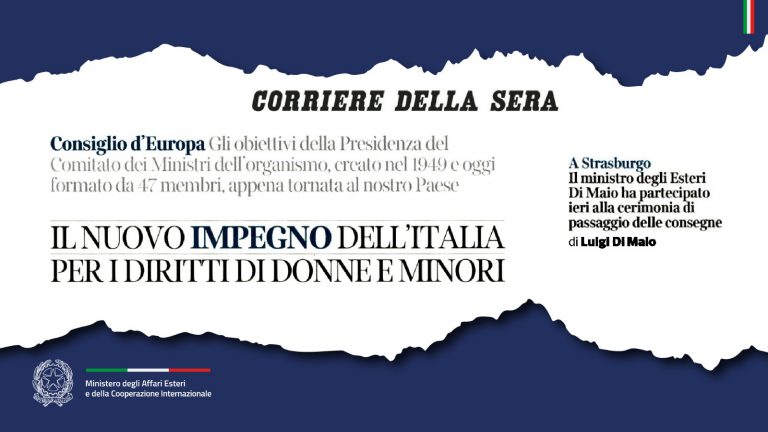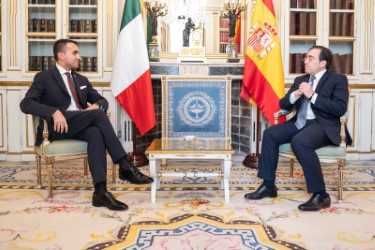The European Union and Russia have to understand that they are “doomed” to cooperate. Italy is prepared to do its part, bolstered by its historic ties with Moscow, and has therefore flung wide its doors to a meeting in Trieste centred on dialogue and cooperation, as Minister for Foreign Affairs Emma Bonino explained.
EU-Russia: what change might the future hold?
The European Union is an important partner for Moscow, just as Moscow is for us. And I am not only referring to trade and economic relations, but also politically. The future of our relations lies, first and foremost, in unprejudiced dialogue, first in areas where convergence already exists and then in more complex points of encounter. If we hold back defensively we do not help trade and the free circulation of ideas, persons, goods and capital. We intend to make strengthening dialogue with Moscow a prominent concern of our future EU presidency, in an effort to find lasting solutions also in matters of energy, commerce and visas – delicate areas where the positions of Brussels and Moscow have thus far been distant.
Ukraine. A match won by Moscow or lost by Brussels?
We cannot talk about victories or defeats. We respect Kiev’s decision and, if it is not possible now to sign the Association Agreement, that doesn’t mean that we have to build a wall and condemn anyone. The conditions were obviously not yet ripe and we can’t ignore the geographic position and very strong ties between Ukraine and Russia. There has to be dialogue with both Kiev and Moscow in order to confront a series of problems afflicting a part of the world that is crucial in geopolitical and energy terms. The signing of the AA was and remains the fruit of Ukraine’s choice and it is up to the Ukrainians to enact reforms and decide whether an EU membership is compatible with their relationship with Moscow. It doesn’t have to be a zero sum game, but a gradual integration by Western Europe with the former Soviet Union, which does retain some peculiar features.
The South Stream project is not only a gas pipeline. What opportunities does it offer?
The South Stream project has strategic value for Moscow and for the European Union since, in terms of what more directly concerns us, it contributes to the diversification of sources that is fundamental to ensuring energy supply security. ENI is directly involved in building the underwater section of the pipeline, but other economic opportunities could also open up as well for services associated with the realisation of such an important project. From a more strictly political standpoint, the South Stream could also provide the basis for more effective dialogue between Moscow and the EU, in light of the Russian requests that the project be exempted from the application of Community discipline. In the context of our EU presidency we intend to encourage encounter and the resolution of existing problems in order to ensure that diversification of sources.
The Pan-European corridors stop at Kiev. Is it possible to predict their co-management with Moscow going eastward?
First of all I think that the South Stream project is already a valid example of Europe-Russia collaboration on energy corridors; indeed, both Russian and European firms will be running the gas pipeline, and there are other forms of cooperation between EU countries and Moscow, such as the North Stream pipeline, which is already operational. Additional forms of cooperation will certainly develop over the coming decades, and there are interests and friendships among the peoples that will last over time. The challenges coming from other areas of the world, as well as a clear economic complementarity, are all pushing us toward gradual integration.
Adriatic ports: is there a strategy that can give us access to former Soviet markets?
The current economic situation obliges us to develop every opportunity offered by foreign markets in order to fuel economic growth and employment. The markets accessible from the Adriatic ports offer opportunities that our firms cannot let slip through their fingers. It is going to be crucial to work on developing those regions’ infrastructure. We are currently working on strengthening the competitiveness of the upper Adriatic ports. Within this context we are developing the “Highways of the Sea” project and giving strong impetus to interconnections between the ports and other inland transport networks; indeed, it would be useless to upgrade shipping and port capabilities while at the same time neglecting to reinforce their connection with road and rail networks that bring the goods to market. To that end, we are strengthening our collaboration with Slovenia and Croatia and expect to be able to rely on synergies with the European Union Strategy for the Adriatic-Ionian Region, whose action plan will be adopted in 2014 during the Italian EU duty presidency.



